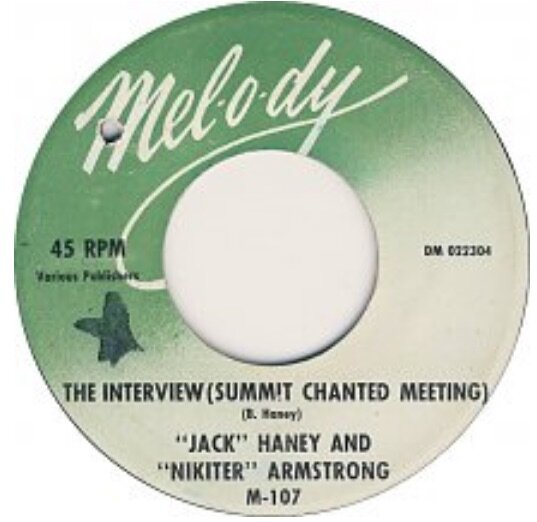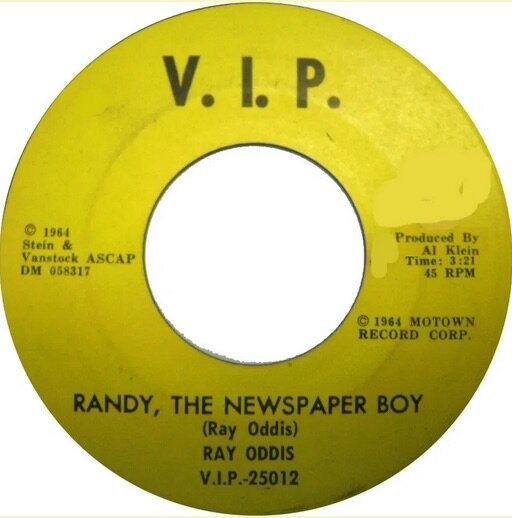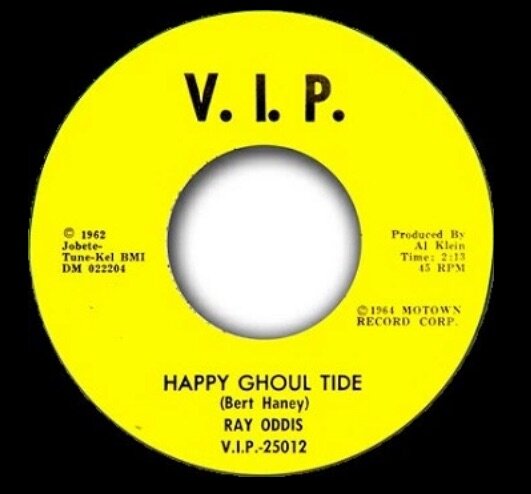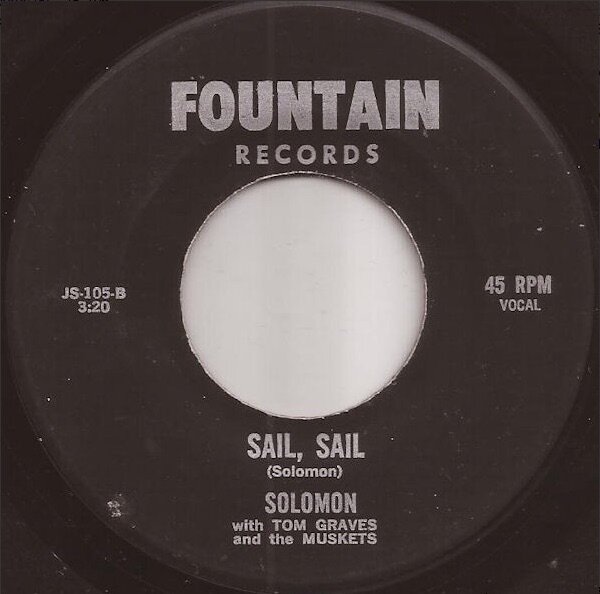Everything posted by Robbk
-
Magnum Records - Help Please
No, I never knew for sure that he was a songwriter or songwriter/producer with them. I just heard that as a rumour from one or two L.A. record collectors. I did see his name as co-writer on one or two of Hal Davis' Finesse Music published songs on small Hal Davis-related L.A. labels, which seemed to go along with the rumour. He was one of the group of Watts/South Central/South L.A. producers and songwriters who hung out together, and sometimes worked together on projects with the same small label, and he had one or two of his own productions, or self-written sons released on the same small L.A. label as had released Jobete songs, so I guessed that he might have been among the writers whose songs could be used by Davis and Gordon to offer to Jobete. Now that I've looked through all my records in those labels, I'm wondering if that was a reasonable conclusion. He may have just been a general colleague as a fellow South L.A. writer/producer, who crossed paths with all the Jobette crew, but never had actually worked on a Jobette project. Or, maybe I saw a Jobette song he co-wrote in another collector's collection, and I've since forgotten the record?
-
Rose Batiste Hit And Run
I never did understand why Martha would have recorded a solo for Don Davis, as late as 1965 or 1966, well after becoming a mega-star with Motown. She did record, along with her group members, some backgrounds for Joe Hunter, for use on J.J. Barnes releases in late 1963 and early 1964 (after "Heatwave", but before she had gathered in a lot of money, and while Motown was still parceling it out very slowly to her. I found it very hard to believe. And I wasn't sure, after listening over and over to it, that that was really Martha.
-
Rose Batiste Hit And Run
This woman has a higher pitch than Rose Batiste in her normal voice. So. I'm inclined to believe it is more likely to be Gwen Owens singing this, than Rose. But, it could be any of several women who sang for Davis by the early Solid Hitbound period. I have seen "guesses" of Gwen Owens" on uncredited Groovesville acetates, but I can't remember any true confirmation that Owens ever recorded for them. Has anyone here seen or heard any authoritative conformation that she had before the release of Revilot 204?
-
Rose Batiste Hit And Run
I seem to remember when Don Davis' "Groovesville" and other tapes were procured, some of them were unlabled as to the artist name, and there were "guesses" made when they came available to the public on "The Groovesville Masters or Tapes", released CD. What we do know is that many of the Don Davis-related Groovesville, Solid Hitbound, Golden World/Ric Tic, and Thelma cuts that were or were not released on record, had more than one, and often 2 or 3 versions made by different artists. Just like Motown, these off-Motown, Don Davis-related labels often had different artists record a given song, originally (sometimes one was originally a demo, whose vocal could later be given a full, finished mix, or tracks made with an earlier company still in Davis' hands, could be used with a different artist produced by Davis, while working with a later company). So, some of the artists on some of the artist-unlabled tapes of previously unreleased versions, are still not officially confirmed, (even though, being labeled with the non-confirmed "guesses" has semi-legitimized them from their familiarity.
-
Philly labels
The Stylistics on AVCO Int., and Gamble an Huff also having Neptune and Gamble Records, and being with Motown after Philly Int. There were many other labels that sported Philly-Sound productions.
-
Rose Batiste Hit And Run
I concur. In all my years of searching through, literally, over a million 45s, I've never seen nor heard of "Hit and Run" being on a pink label pressing.
-
Emanuel Laskey-Dont Lead Me On-Mix Question?
No. Only some. My first one bought had them on correctly.
-
Emanuel Laskey-Dont Lead Me On-Mix Question?
I bought the Bell Sound version in Chicago, while it was played on WVON, when the record was out. I didn't see the other version until some time in the 1970s, maybe after the original find of the saved stock. I don't think that version was distributed in The Midwest during the records original run. I suppose it's possible that that version was sent by accident to another area of The US. The main area I never looked for records was The Deep South (mainly The ex-Confederate States. I DID search California, The Pacific Northwest, The Mountain States, The Midwest regularly, and 2 trips to The East Coast, so i probably would have found it in those places if it had been issued there. So, IF it had been released when the record was originally issued, it likely would have been to Southern distributors.
-
Worst Record I've Ever Heard
Wow!! It's even worse than I remembered!!! Jerry Mathers had a great career awaiting him in Soul music! Maybe they should have formed a harmony group of Jerry Mathers, Burt Ward, Jerry Solomon, William Shatner and Mrs. Miller? (one female singer) - like The Platters. Might have been interesting. 🤮
-
Worst Record I've Ever Heard
Isn't it bad enough to be trying to fight off a pandemic. Do we need to deal with drek like this, too??? As Mill Evans (Edwards) once sang, "Why? Why? Why?"
-
Worst Record I've Ever Heard
Not one of our better Canadian singers! 🤮
-
Worst Record I've Ever Heard
Can't argue with that. But I'd rather hear that type of lyrics in records playing music and singing I like, to go along with them - such as swing tinged Jump Blues (Louis Jordan and his Tympany Five), and early '50s R&B (Flamingos on Chance and Parrot/Swallows on King/Five Royales on Apollo, etc.).
-
Eddie Hughes or Don Hysung bard records soul searcher
Yes, he was the same singer. It's really hard to believe that Al ("Eddy"), with that deep, full, rich, and smooth-mature-sounding voice, was only 14 years old at the time he recorded "Soul Searcher", and only 16 or 17 when he recorded his Scope Records stomper. But that's what he says, and he'd have no reason to pretend to have been younger.
-
Worst Motown Record?
The Interview (Summit Chanted Meeting) was the first Motown "break-in" record, and was much worse than Captain Zap's:
-
Worst Motown Record?
Here's "Randy The Newspaper Boy" - bring out the vomit bags!https://www.youtube.com/watch?v=T0d3d_1ocbc
-
Worst Motown Record?
https://www.youtube.com/watch?v=vBUyxwo7pQQThose all make for not very pleasant listening. But "Happy Ghoul Tide" by Ray Oddis (VIP 45) is truly horrendous! It's flip, "Randy The Newspaper Boy" is actually worse (but less interesting).
-
Worst Motown Record?
Did The Monitors actually record that song??? I've only encountered The Originals' recording of it. Are you sure you didn't mean "by The Originals"?
-
Worst Record I've Ever Heard
You didn't miss anything, at least on the original poster's post regarding the rules. He said nothing about having only songs played by DJs at NS do's. It's just "The Worst Record I Ever Heard".
-
Hidden Motown Delights.
Thanks!
-
Hidden Motown Delights.
Pretty nice! When was it recorded? Sounds like early to mid '70s. Too bad Ronnie's vocal is covered up by the background singers' chorus in several spots. I would have stepped up the lead vocal track more, or lowered the background vocal track a bit.
-
Worst Record I've Ever Heard
Wow!!! Bobby Sanders flipped out!! Went mad! He must have gone to the wrong drug party!! I never knew that! It's bloody awful, but nothing as bad as Jerry Solomon, Mrs. Miller, a few of Dora Hall's cuts, and even many Pop hits, like "Laugh At Me" by Sonny and Cher, or anywhere near as bad as his own MGM cut just above.
-
Worst Record I've Ever Heard
Transfusion was a monster Pop hit in the late '50s. I never listened to the White stations, but did hear it in Winnipeg, because Canadian radio was "lily White" back in the late '50s. It's pretty bad and I always hated it. But I can upload 50 songs 100 times worse than that (all by Jerry Solomon), whose absolutely best song, which I uploaded above, is a LOT worse than Nervous Norvus. Mrs. Miller beats this one by a ton, too!
-
Worst Record I've Ever Heard
I bought it in 1965, when it was out, in a thrift store for 10¢. Little did I know that it was a "vanity, private press record", like Dora Hall's. This guy kept "singing" and getting his records pressed up through the '70s. His father must have been rich. He had 16 45s and 3 LPs pressed up on his Fountain Records label. The rare LPs are said to sell for over $1,000 (IF any owner is willing to part with them. As horrible as "Sail, Sail" is, it's probably the best of all of his cuts. I didn't want to risk being banned from this forum by posting one of the others. 🙃 Listening to his records makes one feel glad to have been born remotely normal, and in a downtime like the current pandemic and economic depression, it makes one realise that things could always be a good deal worse. 🤓
-
Worst Record I've Ever Heard
And well worth the wait!!! 🤓🤓🤓🤪😜
-
Worst Record I've Ever Heard
https://jerrysolomon.bandcamp.com/track/sail-sail Clearly, you haven't heard "Sail, Sail" by Solomon!!! Will you send €11, instead? Listen to THIS!!! - IF YOU DARE!!! Click on the link at this post's very top, ABOVE the copy of the post to which I am referring. Sorry for the weird positioning of the audio link:






